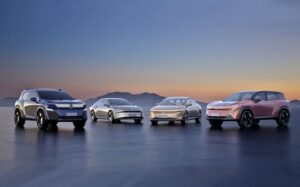In this article, we delve into the factors driving the development of the new Toyota engine, examining the reasons this Japanese automaker is persisting with internal combustion engine technology in an age increasingly focused on electric vehicles.
Toyota Engine’s Role in Record-Breaking Sales
In a remarkable year of sales, Toyota, the renowned Japanese automotive giant, reached a new milestone in 2023, selling a record-breaking 11,233,039 vehicles. However, what’s intriguing is the minuscule role electric vehicles (EVs) played in this achievement. Among the millions of cars sold under the Toyota and Lexus brands, including their other subsidiaries, only 104,018 were battery-operated EVs, a mere 0.926 percent of total sales. This statistic sheds light on Toyota’s continued belief in the longevity and necessity of combustion engines in the automotive market.
The Future Vision for Toyota Engine Technology
At a recent gathering of over 200 corporate managers and executives, Chairman Akio Toyoda made a compelling case for the future of internal combustion engines (ICE). He announced a significant new initiative focused on Toyota engine development, echoing sentiments he previously shared at the 2024 Tokyo Auto Salon. Toyoda’s message was clear: Toyota is not ready to abandon engine technology.
Market’s Future Dynamics
In a candid Q&A session, Chairman Toyoda shared his perspective on the future of EVs. He firmly believes that battery EVs will not dominate more than 30 percent of the market share, irrespective of future technological breakthroughs. This prediction leaves a substantial 70 percent of the market to gasoline vehicles, hybrids, and fuel cell EVs. Toyoda also highlighted the potential of hydrogen-burning combustion engines as a viable alternative, notably excluding diesel from the conversation.
Socio-Economic Implications of Toyota Engine Development
Toyoda’s discourse extended beyond the technicalities of automotive engineering. He addressed the socio-economic implications of a rapid shift to battery EVs, particularly concerning employment. In Japan alone, 5.5 million individuals are employed in the auto industry, primarily in engine-related roles. Toyoda raised concerns about their future, emphasizing that a sudden transition to EVs could lead to widespread uncertainty and financial instability, with some suppliers already facing challenges in securing bank loans.
Toyota Engine: A Balance in the Shift to Electrification
The global automotive industry is indeed witnessing a paradigm shift. Many automakers are intensively focusing on EVs, with some like Jaguar, Chrysler, and Lotus, pledging to completely phase out ICE vehicles by the end of the decade. Toyota’s luxury division, Lexus, has also committed to ending sales of combustion engine cars by 2035.
In Europe, the trend is similar. Stellantis vows to sell only EVs by the end of the decade, while Mercedes plans to go fully electric in Europe by 2030, depending on market conditions. Audi has set 2032 as its deadline for ending ICE car production, with Volkswagen targeting 2033 to exclusively sell EVs in Europe. However, BMW remains an outlier without a defined cutoff date.
Contrary to the widespread shift towards electrification, Toyota, with its new engine development, envisions a more balanced approach. The company acknowledges the limitations of current EV technology and infrastructure, especially in regions where access to electricity is still a challenge. With a significant portion of the world’s population living without reliable electricity, Toyota argues that an all-in EV strategy is not yet feasible, particularly in markets where the Toyota engine has a strong presence.
The Pragmatic Approach
Toyota’s stance, as evidenced by the development of the Toyota engine, is not merely a resistance to change but a pragmatic approach to a multifaceted issue. The company recognizes the urgency of achieving carbon neutrality but emphasizes the need for a diversified strategy. This includes advancing EV technology while simultaneously improving and innovating within the realm of traditional combustion engines, as embodied by the Toyota engine, and hybrid models.
The Future Landscape
As the automotive landscape continues to evolve, Toyota’s approach underscores the complexities and challenges of transitioning to a fully electric future. The company’s commitment to Toyota engine development, alongside its efforts in EV technology, suggests a future where different propulsion technologies coexist, catering to diverse market needs and environmental goals. With this balanced strategy, Toyota is positioning itself as a versatile player in an industry at the crossroads of tradition and innovation.






